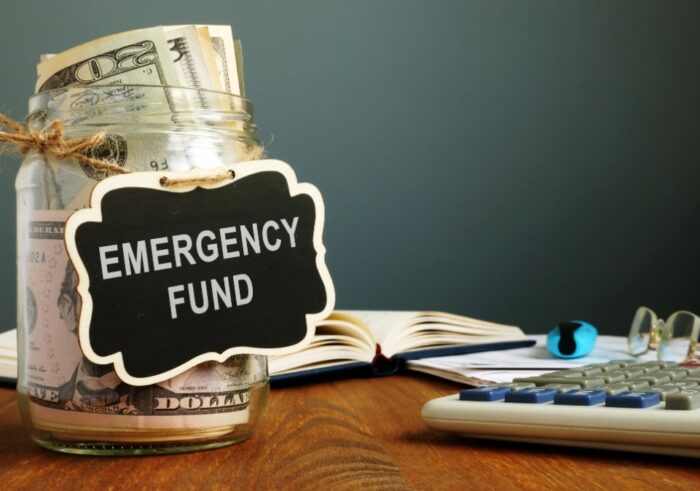
Congrats! You’re a college graduate now, and it’s time to officially start your adult life. Chances are, you’ve already landed your first job. Maybe you’ve even moved out of your parent’s home and into your own apartment. While all these new experiences can be exciting, they can also be daunting. Especially if you’re managing your own finances for the first time.
Looking over bills and picking bank accounts for the first time might cause a bit of panic. But try not to worry, there are easy ways to develop good financial habits. Like any big life change, take financial independence one step at a time.
Here are five tips to help recent graduates become more financially autonomous.
1. Start an Emergency Fund

As a recent college grad, having an emergency fund probably isn’t at the top of your list — but it should be. Life can be unpredictable, and it’s important that you have something to fall back on.
Take this pandemic, for instance. Many people weren’t financially prepared for the economy to plunge as it did. It’s true that things are slowly getting back to normal. However, you need to be prepared for the next pandemic, or an emergency of any sort.
There are many different schools of thought about how much to save in case of an emergency. That said, many financial experts agree that you should save enough to cover your expenses for six months. So if you spend $2,000 a month, you should try to have $12,000 in your savings account.
It’s important to remember that saving money is a process. It’s unlikely that you’ll have $12,000 in your account two months after graduation. How quickly you save is up to you and your circumstances. Create a timeline that makes sense for you, and stick to it.
2. Get a Credit Card
If you don’t already have a credit card, it’s time to get one. Credit cards are a great way to build a credit score, which is something you need to be financially independent. A good credit score puts you in a better position to get approved for a loan for major purchases. Also some landlords use an individual’s credit score to assess a prospective tenant.
If you’re new to credit cards, a credit builder card like Chime’s, is a great option to help you build credit. These cards are similar to normal credit cards, but they tend to have less strict requirements for getting one. That makes a great way for those just starting out in the credit world.
Your deposit acts as a safeguard. If for some reason you miss a payment, the bank can pull what you owe from your deposit. As a result, you essentially can’t default on a secured credit card. While credit cards can help you build credit, they can also ruin your credit score. Overspending and late payments will tank that number. So be wary as you pick a bank and a card.
3. Create a Budget

Contrary to popular belief, creating a budget isn’t hard — it’s sticking to that budget that can be a challenge. That’s why it’s important to make sure that the budget you develop is realistic. First, take a close look at how much you make and where you spend your money.
Then categorize all your expenses. An easy way to do this is by breaking them up into needs and wants. For example, paying rent each month is a need. Going on vacation with your friends? That’s a good example of a want. Once you have your expenses logged, you’ll know exactly how much money you need each month. You can then decide which wants to prioritize based on the money that’s left.
As mentioned, the difficult part of the process is sticking to the budget. If you’re fresh out of college, this may seem even harder. However, there are a few things you can do to make budgeting easier.
Leave Your Credit Card at Home
If you have a tendency to swipe without thought, you should probably leave your credit card at home. Instead, use cash for your day-to-day expenses. People are likely to spend more with a credit card than with cash.
Use an App

There are several different apps you can use to not only track your spending habits, but to hold yourself accountable. For example, Money Manager lets you record your expenses, and it will tell you if you’ve overspent in an area.
Give Yourself an Allowance
Let’s say you have a budget of $3,000 a month. Keep that money separate from any other funds. You can take $3,000 out in cash, or move your remaining balance to your savings account. Either way, the goal is to avoid temptation by limiting your access.
4. Start Paying Off Your Student Loans

According to recent data, about one in eight Americans have a student loan debt. It’s incredibly common, and not something that should be ignored. Even if you have the option to defer your student loans, you might want to think twice about doing so. The longer you wait to start paying, the more debt you’ll acquire, and the longer it’ll take to be debt-free.
One of the first things recent graduates should do is to take a look at their student loans. Determine how much you owe and what the interest rates are. You should also make sure you fully understand the kinds of loans you have. Are they subsidized or unsubsidized? Do you have any private loans?
Once you have a full picture of your loans, you’ll be able to make a plan to pay them down. All of these factors can help you determine if there are certain loans you need to pay off first. This information will also help you figure out what kind of payment plan you qualify for.
5. Improve Your Credit Score
What’s your credit score? If you don’t know, you should probably check. Your credit score is incredibly important because it determines many of your financial options. For example, a bad credit score can prevent you from getting approved to buy a house. A low score also impacts your credit card interest rates. Everything’s more expensive with a low credit score.
Even if you have a solid credit score, there’s always room for improvement. With your diploma newly in hand, you might still be years from buying your first home. However, it takes time to grow your score, so get started right away. One way to improve your score is to make sure you pay your bills on time.
Even one late payment can lower your credit score, and each on-time payment improves your score. This may seem obvious to you, but many people don’t make paying their bills a priority. While some people can’t afford to pay, others simply forget or trivialize that chore. If you’re likely to forget, set up automatic payments.
Just make sure you have enough funds in your account to cover those recurring payments. Life after college can be both exciting and overwhelming. From new homes to new jobs, there may be a lot of changes heading your way. Dealing with your own finances is one of those changes.
Becoming fiscally responsible as a recent graduate may seem overwhelming. However, there are small things you can do to work your way to financial security. The tips above will get you started, and send you into a future full of options.














